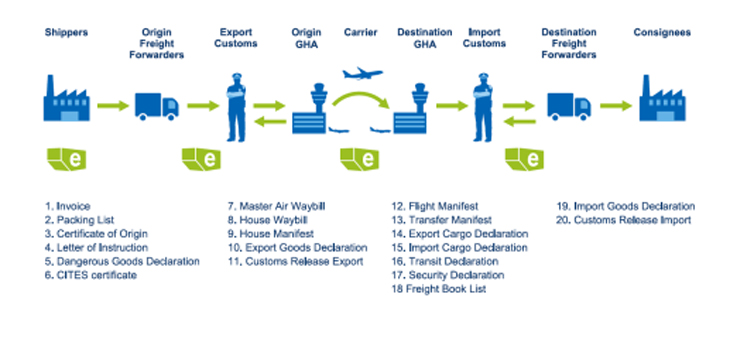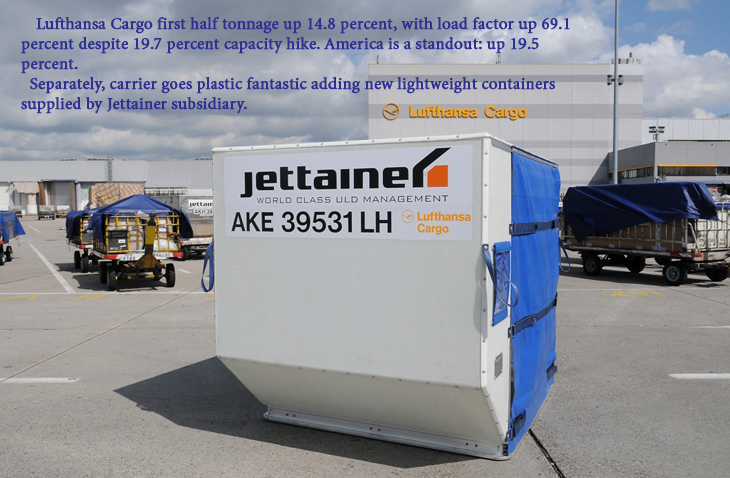
An editorial comment by U.S. Air
Forwarders Association President Brandon Fried entitled “e-freight
incentives will get forwarders on board” is surprising and unexpected
given the history of e-freight development.
This is one of those topics, like
motherhood, apple pie and the corn thigh-high by the Fourth of July, where
we think ‘who can be against it?’ Everyone agrees it’s
good for you; it’s the only way to save the industry, manage costs
efficiently and provide that elusive, reliable, high quality customer
service.
And yet, the article referenced mentions
the hope that the new IATA Director, General (Tony Tyler), “will
continue IATA’s nascent engagement with freight forwarders.”
Unless somebody has spent the last
twenty years or so under a rock, this has been, in its various forms,
a front burner matter for the industry and IATA.
But the illusion that it’s up
to IATA to make this happen is as debatable as the government being in
charge of creating private sector jobs, and the chances of success are
about the same, so don’t hold your breath!
The assertion that the e-freight initiative
has failed because the benefits haven’t been sufficiently explained
to the forwarders is outlandish; to say the least, and it also flies in
the face of the facts.
So is also the claim that IATA had only
limited input from forwarders.
And by the way, “only 1 percent
of air waybills worldwide are currently transmitted electronically,”
which Fried writes, is technically incorrect; the Cargo 2000 monthly report
is instructive.
FWB messages transmitted worldwide
outside Cargo 2000 are not easily measured.
Going all the way back to the early
days of cargo community systems—GLS, Cargo MEDIA, TDNI, just to
name a few memory-jogging developments which predated Cargo 2000 and subsequently
e-freight—the issue has been confusion, costs, and control interchangeably.
Just like some leading, forward thinking
forwarders—AEI comes to mind—didn’t need IATA or anybody
else to invest in and develop their own global IT system and connect host-to-host
in those days to the airlines, because it was abundantly clear to them
that this was to become an indispensable, strategic tool that would pay
dividends for years to come.
Hello, Colin Cook (AEI VP and Chief
Information Officer) – I hope you enjoy a well-earned retirement!
And talking about the past, we were
present in the Cargo 2000 meeting mentioned by Fried that took place in
Canada and can say that Brandon Fried’s reference to IATA’s
late “technology chief” Ron Cesana is yet another misstatement,
because Ron was Cargo 2000 project director and Cargo 2000 is actually
an IATA interest group.
Why it is that Scandinavia, Switzerland,
Ireland and Hong Kong were early adopters with a very high level of EDI
(electronic data interchange) throughout the air cargo community, including
the forwarders?
It can’t be in the water, that’s
for sure. Questioning whether e-freight has become complicated is just
another red herring and an excuse to obfuscate the issue.
And the next claim by Fried that “Forwarders
cannot be expected to invest in an electronic data transmission program
that is not universally accepted by all nations,” deserves some
attention as well.
That statement, while oblique, at
least finally gets closer to the truth – this is ultimately, and
has always been, about money.
There are no universally accepted
EDI programs other than IATA Cargo-IMP messages, Cargo-FACT (EDIFACT),
and their XML versions, but the world is waiting for any forwarder organization
to come out with a standard of their own that the rest of us can adopt…
or not?
As we recall, the house waybill numbering
scheme hasn’t been standardized so yes, the world is waiting!
Brandon Fried, referring to pre-screened
cargo and electronic filing of documents, also writes:
“IATA carriers could reward
these two time- and cost-saving measures with shipment discounts or faster
processing.”
To that we can only wonder:
Has anyone heard of antitrust and
the outcry that would occur had the carriers sat down to discuss these
well-intended “rewards?”
And yet there is little new ground
here – for example, several years ago Qantas introduced a policy
at the airport to give priority to cargo for which EDI had been provided,
while those with paper air waybills had to queue up and wait their turn.
But the question is whether some forwarders
may be still holding out for more tangible incentives.
In the past, airlines traded free
status update messages for FWBs sent by a forwarder; the Unisys CPS is
another facility that’s free of charge for participating forwarders,
but e-freight takes all this to a higher level as the IATA e-freight Scope
of Documents web page below indicates:

Interestingly, the shipper and forwarder
are responsible for most of these documents, many of which are specific
to their needs. So we can only wonder: why do the forwarders need the
carriers to provide incentives?
Ted
|




